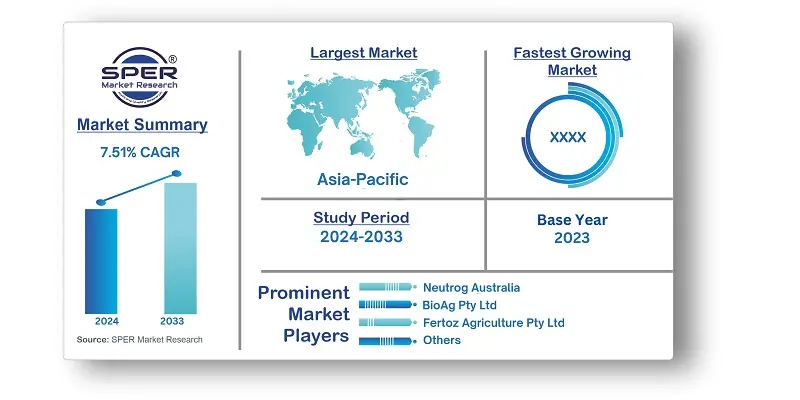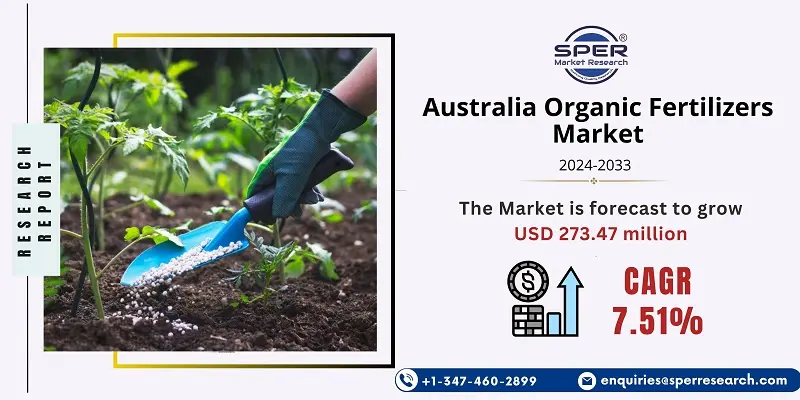
Australia Organic Fertilizers Market Growth, Size, Trends, Demand, Revenue and Future Outlook
Australia Organic Fertilizers Market Size- By Source, By Crop Type, By Nutrition Content, By Form- Regional Outlook, Competitive Strategies and Segment Forecast to 2033
| Published: Jul-2024 | Report ID: AGRI2432 | Pages: 1 - 101 | Formats*: |
| Category : Agriculture | |||
- In July 2023, Yara opened its first water-soluble fertiliser facility in China. This strategic step is consistent with Yara China's commitment to offering sustainable agriculture solutions based on local crop demands. The new facility intends to improve the efficiency and effectiveness of nitrogen delivery to crops, thereby assisting China's agricultural industry in achieving greater production and sustainability. By building this facility, Yara improves its position in the Chinese market while also emphasising its commitment to promoting environmentally friendly farming methods with novel fertiliser products.
- Fertoz purchased Excel Industries in June 2022 with the goal of developing a specialised fertiliser pellet product for the organic and regenerative agriculture sectors in North America. Nitrogen, phosphorus, and potassium are among the necessary components in this product. Fertoz is to invest $1.28 million to build a factory capable of generating 80,000 tonnes of pellets per year. This acquisition and investment demonstrate Fertoz's dedication to sustainable farming techniques by offering high-quality, nutrient-rich fertiliser products that improve soil health and crop yields in organic farming systems.


| Report Metric | Details |
| Market size available for years | 2020-2033 |
| Base year considered | 2023 |
| Forecast period | 2024-2033 |
| Segments covered | By Source, By Crop Type, By Nutrition Content, By Form |
| Regions covered | Western Australia, New South Wales, Queensland, Victoria, Rest of Australia |
| Companies Covered | Neutrog Australia, BioAg Pty Ltd, Fertoz Agriculture Pty Ltd, Sustainable Farming Solutions Pty Ltd. |
- Organic Farmers
- Conventional Farmers Transitioning to Organic
- Home Gardeners
- Horticulturalists
- Agricultural Cooperatives
- Agribusiness Companies
- Government and Non-Governmental Organizations (NGOs) promoting sustainable farming
- Retailers and Distributors of Agricultural Products
| By Source: |
|
| By Crop Type: |
|
| By Nutrition Content: |
|
| By Form: |
|
- Australia Organic Fertilizers Market Size (FY’2024-FY’2033)
- Overview of Australia Organic Fertilizers Market
- Segmentation of Australia Organic Fertilizers Market by Source (Plant-Based Organic Fertilizers, Animal-Based Organic Fertilizers, Mineral-Based Organic Fertilizers)
- Segmentation of Australia Organic Fertilizers Market by Crop Type (Cereals and Grains, Oilseeds and Pulses, Fruits and Vegetables, Others)
- Segmentation of Australia Organic Fertilizers Market by Nutrition Content (Presence of Organic Substance up to 60%, Presence of Organic Substance from 40% to 60%, Presence of Organic Substance from 20% to 40%)
- Segmentation of Australia Organic Fertilizers Market by Form (Dry Organic Fertilizers, Liquid Organic Fertilizers)
- Statistical Snap of Australia Organic Fertilizers Market
- Expansion Analysis of Australia Organic Fertilizers Market
- Problems and Obstacles in Australia Organic Fertilizers Market
- Competitive Landscape in the Australia Organic Fertilizers Market
- Impact of COVID-19 and Demonetization on Australia Organic Fertilizers Market
- Details on Current Investment in Australia Organic Fertilizers Market
- Competitive Analysis of Australia Organic Fertilizers Market
- Prominent Players in the Australia Organic Fertilizers Market
- SWOT Analysis of Australia Organic Fertilizers Market
- Australia Organic Fertilizers Market Future Outlook and Projections (FY’2024-FY’2033)
- Recommendations from Analyst
1.1. Scope of the report1.2. Market segment analysis
2.1. Research data source2.1.1. Secondary Data2.1.2. Primary Data2.1.3. SPER’s internal database2.1.4. Premium insight from KOL’s2.2. Market size estimation2.2.1. Top-down and Bottom-up approach2.3. Data triangulation
4.1. Driver, Restraint, Opportunity, and Challenges analysis4.1.1. Drivers4.1.2. Restraints4.1.3. Opportunities4.1.4. Challenges4.2. COVID-19 Impacts of the Australia Organic Fertilizers Market
5.1. SWOT Analysis5.1.1. Strengths5.1.2. Weaknesses5.1.3. Opportunities5.1.4. Threats5.2. PESTEL Analysis5.2.1. Political Landscape5.2.2. Economic Landscape5.2.3. Social Landscape5.2.4. Technological Landscape5.2.5. Environmental Landscape5.2.6. Legal Landscape5.3. PORTER’s Five Forces5.3.1. Bargaining power of suppliers5.3.2. Bargaining power of buyers5.3.3. Threat of Substitute5.3.4. Threat of new entrant5.3.5. Competitive rivalry5.4. Heat Map Analysis
6.1. Australia Organic Fertilizers Market Manufacturing Base Distribution, Sales Area, Product Type6.2. Mergers & Acquisitions, Partnerships, Product Launch, and Collaboration in Australia Organic Fertilizers Market
7.1. Australia Organic Fertilizers Market Size, Share and Forecast, By Source, 2020-20267.2. Australia Organic Fertilizers Market Size, Share and Forecast, By Source, 2027-20337.3. Plant-Based Organic Fertilizers7.4. Animal-Based Organic Fertilizers7.5. Mineral-Based Organic Fertilizers
8.1. Australia Organic Fertilizers Market Size, Share and Forecast, By Crop Type, 2020-20268.2. Australia Organic Fertilizers Market Size, Share and Forecast, By Crop Type, 2027-20338.3. Cereals and Grains8.4. Oilseeds and Pulses8.5. Fruits and Vegetables8.6. Others
9.1. Australia Organic Fertilizers Market Size, Share and Forecast, By Nutrition Content, 2020-20269.2. Australia Organic Fertilizers Market Size, Share and Forecast, By Nutrition Content, 2027-20339.3. Presence of Organic Substance up to 60%9.4. Presence of Organic Substance from 40% to 60%9.5. Presence of Organic Substance from 20% to 40%
10.1. Australia Organic Fertilizers Market Size, Share and Forecast, By Form, 2020-202610.2. Australia Organic Fertilizers Market Size, Share and Forecast, By Form, 2027-203310.3. Dry Organic Fertilizers10.4. Liquid Organic Fertilizers
11.1. Australia Organic Fertilizers Market Size and Market Share
12.1. Australia Organic Fertilizers Market Size and Market Share By Region (2020-2026)12.2. Australia Organic Fertilizers Market Size and Market Share By Region (2027-2033)12.3. Western Australia12.4. New South Wales12.5. Queensland12.6. Victoria12.7. Rest of Australia
13.1. Neutrog Australia13.1.1. Company details13.1.2. Financial outlook13.1.3. Product summary13.1.4. Recent developments13.2. BioAg Pty Ltd13.2.1. Company details13.2.2. Financial outlook13.2.3. Product summary13.2.4. Recent developments13.3. Fertoz Agriculture Pty Ltd13.3.1. Company details13.3.2. Financial outlook13.3.3. Product summary13.3.4. Recent developments13.4. Sustainable Farming Solutions Pty Ltd13.4.1. Company details13.4.2. Financial outlook13.4.3. Product summary13.4.4. Recent developments13.5. Others
SPER Market Research’s methodology uses great emphasis on primary research to ensure that the market intelligence insights are up to date, reliable and accurate. Primary interviews are done with players involved in each phase of a supply chain to analyze the market forecasting. The secondary research method is used to help you fully understand how the future markets and the spending patterns look likes.
The report is based on in-depth qualitative and quantitative analysis of the Product Market. The quantitative analysis involves the application of various projection and sampling techniques. The qualitative analysis involves primary interviews, surveys, and vendor briefings. The data gathered as a result of these processes are validated through experts opinion. Our research methodology entails an ideal mixture of primary and secondary initiatives.



Frequently Asked Questions About This Report
PLACE AN ORDER
Year End Discount
Sample Report
Pre-Purchase Inquiry
NEED CUSTOMIZATION?
Request CustomizationCALL OR EMAIL US
100% Secure Payment






Related Reports
Our Global Clients
Our data-driven insights have influenced the strategy of 200+ reputed companies across the globe.




















